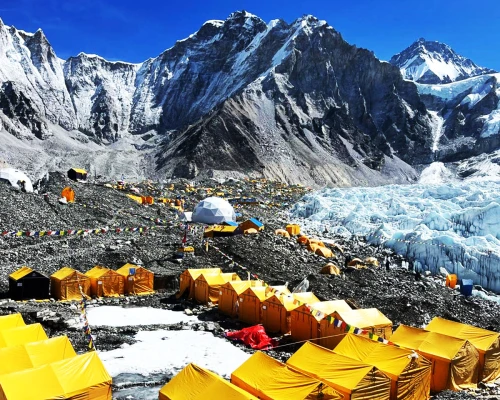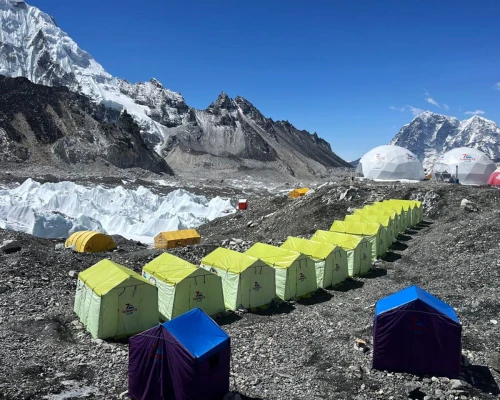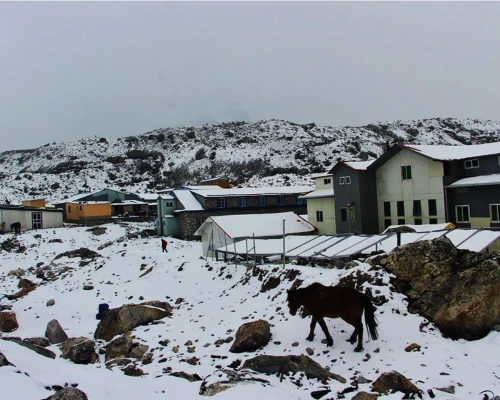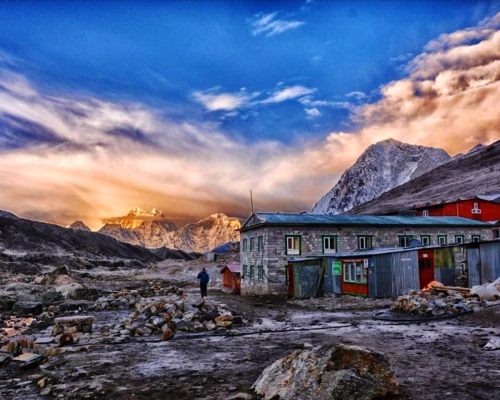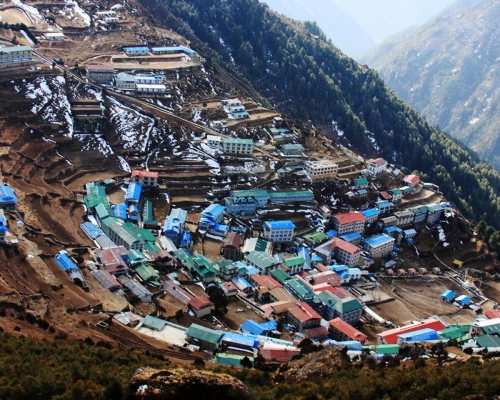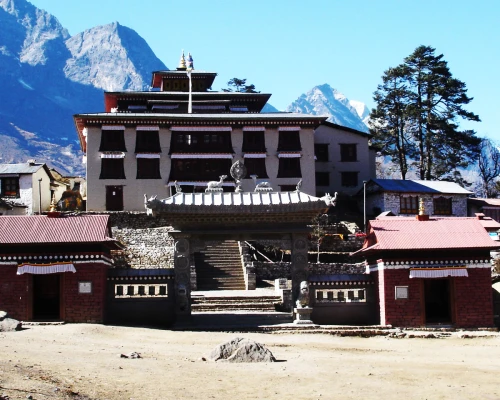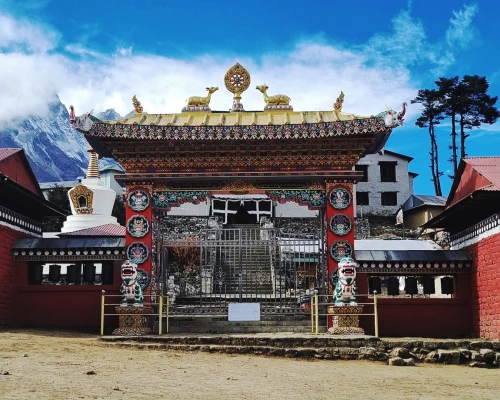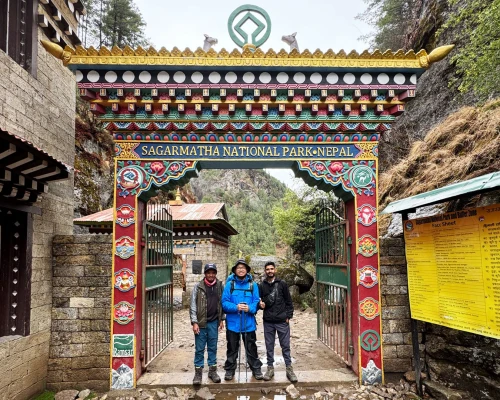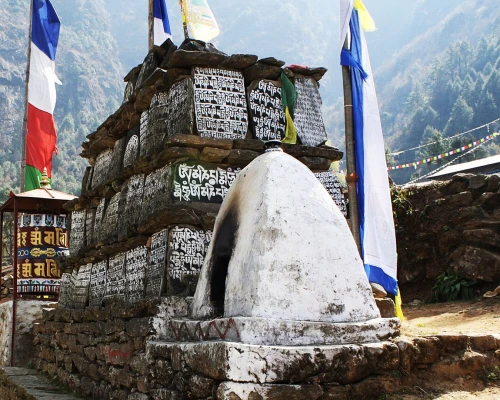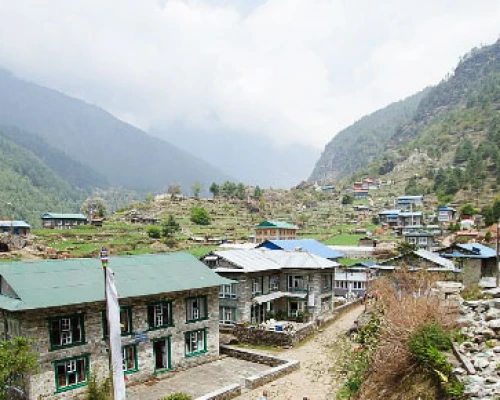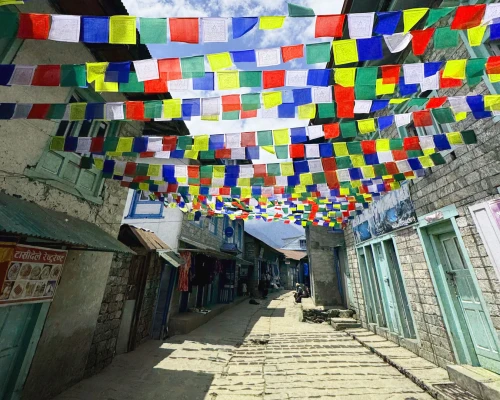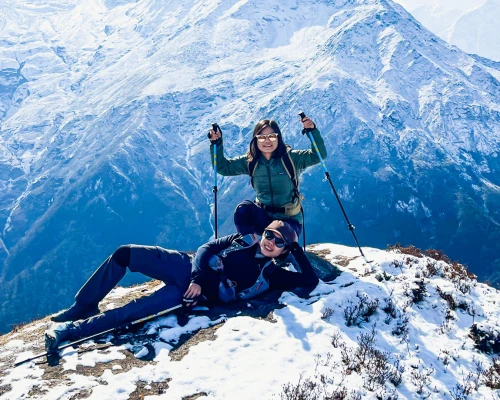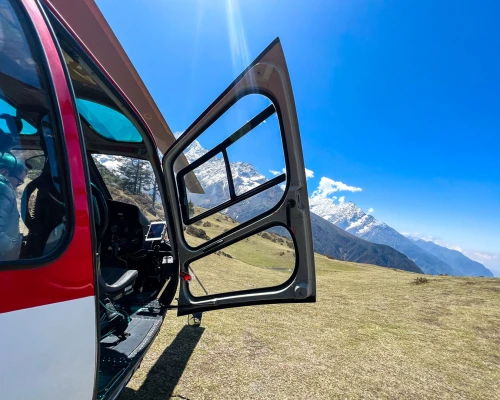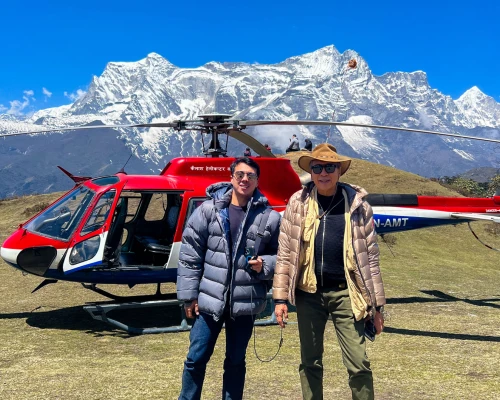Everest base camp short trek is a 7 days high altitude trekking journey in Sagarmatha National Park that takes you to the base of Mount Everest. This is a week-long trekking package that is accomplished with a helicopter ride back to Kathmandu.
Generally, the Everest base camp trek takes around 2 weeks to complete. However, after carefully considering our client requirements, we have created this Everest base camp short trek, which takes only 7 days to conquer. It is one of the most popular trekking packages in the Everest region because of its time consideration.
Our Everest base camp short trek in 7 days itinerary is best fit for all kinds of age groups. We specially designed this package for all kinds of trekkers or hikers, like professional trekkers, corporate officials, solo or groups of friends and family, and senior travellers. We also provide special and personalised trekking experiences for specially abled people.
One of the important features of choosing a short trek in Everest is that it gives you an extreme level of adventure experience in the shortest time frame so that you can enjoy several other trekking and tours in Nepal.
The EBC short trek covers a distance of approximately 250 kilometres in a week from Kathmandu to Everest base camp, and upon completion of the ride back in a chopper to Kathmandu within 5 to 6 hours. It offers breathtaking views featuring the mighty Mt. Everest (8,848.86 meters) along with the world's five highest peaks.
In our package, we will stop at UNESCO-listed natural wonders and experience the rich cultural diversity of Sherpa villages along the trail. Everest base camp short trek is the shortest trekking itinerary to experience amid the stunning beauty of the Himalayas in Nepal. The seven-day trek to Everest Base Camp takes us through suspension bridges and villages, which promise to offer a rich cultural experience of the Himalayas.
As we ascend through the pristine pine forests of the Khumbu region, the vibrant rhododendron flowers, Nepal's national flower, will enchant us. This region is a popular destination for eco-tourism because it is home to rare bird and animal species, creating a perfect blend of nature and adventure.
The best time to take this Everest Base Camp short trek is during the spring and autumn seasons, from March to May and September to November. These months promise clear skies, good weather, and optimal visibility, making it perfect for capturing the breathtaking Himalayan landscape.
Our services are designed to make your trekking experience seamless and enjoyable, with experienced guides, comfortable accommodations, and a well-planned itinerary. Come join us on this short yet fulfilling 7-day trek to Everest Base Camp and create unforgettable memories that will stay with you forever. Check our availability and book your adventure now, making 2025 and 2026 the year you conquer the Everest region!
Major Attractions of Everest Base Camp Short Trek
- Ascend to Everest base camp and Kala Patthar.
- Beautiful mountain views of hundreds of peaks throughout the trek
- Chance to explore the Himalayan region from land and air
- Green vegetation and an outstanding forest of pine, oak, and rhododendron
- Maniwalls, colorful prayer flags, lakes, glaciers, and icefalls
- Opportunity to explore ancient Tengboche monastery,
- Get to explore a vibrant and bustling Sherpa market in Namche.
- Charming Sherpa villages like Pangboche and Dingboche
- Hike to Kala Patthar viewpoint for unparalleled panoramic vistas of Everest, Nuptse, and neighboring peaks.
Everest Base Camp Short Trek Costs for 2025 and 2026
The cost for the Everest Base Camp short trek is $2950 per person on a group sharing basis. This includes everything you need—guides, permits, comfy accommodation—as you trek with a friendly group towards Everest Base Camp.
If you prefer a more private trekking experience, our private Everest short treks range from $2950 to $6650 per person, depending on what you're looking for. We can personalize our private trek options to fit your needs, whether you prefer a solo adventure, a couples trip, or a family expedition.
No. of Pax | Cost per person |
|---|---|
1 Pax | $ 6650 |
2 Pax | $ 3850 |
3 Pax | $ 3350 |
4 Pax | $ 3150 |
5 - 10 Pax | $ 2950 |
We make it simple for you to reserve your spot on the 2025 & 2026 Everest Base Camp Shortest Trek. Make the year you begin this incredible journey, taking in the towering peaks and distinctive culture of the Everest region. Don't miss out! Book now and get ready for an adventure of a lifetime!
Details of Everest Base Camp Short Trek
- Trekking duration: 7 days
- Starting point: Kathmandu
- Ending point: Kathmandu
- Maximum altitude: 5,545 meters (Kala Patthar)
- Minimum altitude: 1,400 meters (Kathmandu)
- Domestic flights: Kathamndu to Lukla by Regular flight
- Helicopter flights: Gorak Shep to Kathmandu (65 minutes)
- Accommodation: Tea houses
- Food: Breakfast, Lunch and Dinner
- Average walking hours per day: 3 to 7 hours
- Helicopter weight allowance: 400 kilograms (including passengers and luggage)
- Major attractions: mountain ranges and peaks, hills, rivers, lakes, cascades, icefalls, local settlement and culture, flowers and wilderness, monasteries, shrines, Chortens, memorials, aerial view of the mountain ranges, etc.
Best Season for Everest Base Camp Short Trek
The best season for a short trek to Everest Base Camp is during the spring and autumn months, making the trekking period generally from late March to early June and then from September to November. During these periods, the weather is relatively stable, with clear skies, mild temperatures, and minimal precipitation, providing ideal conditions for a memorable trekking experience.
Spring, from March to May, is a popular season due to the blooming rhododendron flowers, lush landscapes, and moderate temperatures. The trails come alive with vibrant colors, creating a picturesque setting against the backdrop of the majestic Himalayas.
Autumn, from September to November, is another excellent time for the Everest Base Camp short trek. The skies are clear, offering breathtaking views of the surrounding peaks. The temperatures are cool but not extreme, making it comfortable for trekking. The trails are also less crowded compared to the spring season.
Although the primary trekking seasons are spring and autumn, it's worth mentioning that you can also do the Everest Base Camp short trek in January and February as well, provided the weather is favorable. During these winter months, the temperatures can be chilly, and there may be some snow on the trails. However, if the weather conditions are pleasant, it can be a unique and peaceful time to experience the Everest region, with fewer trekkers on the trails and pristine snow-covered landscapes.
Book now and get free t-shirts, caps, and stickers.



